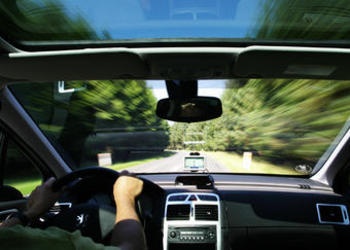Finding Your Way with No GPS

We started out on our trip, a long cross-continental journey to see family in the Pacific Northwest and western South Dakota, with no GPS unit. Technically we had one, but it stopped tracking at the border of Illinois, dropping us into a void of non-digital migration. What could we do? Luckily, being fans of maps we were well supplied and it forced us to renew a skill we had neglected, map reading.
A recent study, by satellite navigation maker Garmin, finds that one third of travelers no longer know how to use a traditional paper map. In addition, the study found that one out of ten people admit they rely greatly on their GPS unit, including for trips they take often and with which they are already familiar (Ellie Zolfagharifard, “Can YOU Read a Map? A Third of People Can’t – And Half Won’t Admit It (With Men Being the Worst Offenders),” The Daily Mail at DailyMail.co.uk, July 25, 2014).
Lost skills
I have to admit that my family and I fall into this category, too, turning on our GPS unit for trips that we could probably make by memory. It’s easy to convince ourselves that we really just want to know how long it will take us to arrive (which we could figure out by looking at the clock), or which is the quickest route (we could just use a good map), how many miles between us and our destination (a mileage chart and a calculator would work just as well), or what elevation we’re currently driving at (important only if you are at risk of elevation sickness).
The GPS unit supplies a lot of information, but what is the cost? In my personal experience the cost of convenience is the loss of basic skills like using a paper map, being aware of my surroundings, taking advantage of the information available all along the highway system, and thinking and planning ahead. On our trip I was forced to use all of these skills to calculate mileage, find hotel locations, know the road and the area we were driving in, and be aware of problems in the flow of traffic around us.
A defective GPS
There is a spiritual lesson in all of this. How often do we take off in a direction in life, relying on the society around us to carry us with the flow of traffic, not looking around at what’s really out there? By not analyzing the trends, morality and motivations of the world around us we can get caught in Satan’s sticky spider-web of moral slackness and degradation. This affects God’s people of any age, but especially young people, since the world markets to our weaknesses… emotional immaturity and inexperience.
So if the satellite navigation unit of this world, the themes of perverted entertainment, self-centered ambition, and wealth at any cost issuing from popular society are defective, what do we do? Turn back to some old-school techniques, learn to read and access the paper map equivalent of directions for a moral life, the Bible.
Scriptural map reading
God’s word is preserved for us, and is applicable at any age, but for the young it helps us learn the lessons of inexperience and immaturity, so that we won’t have to trip over ourselves. But the Bible only does us good if we read it. The apostle Paul gives us some poignant instruction through his letter to the young Timothy, “Be diligent to present yourself approved to God, a worker who does not need to be ashamed, rightly dividing the word of truth. But shun profane and idle babblings, for they will increase to more ungodliness,” (2 Timothy 2:15-16).
We also can’t let the world or popular Christianity interpret God’s Word for us. Humble, prayerful study alone allows us to make use of the scriptures. The Bible interprets itself, but we, the human component, have to be willing to hear what it has to say and we have to have practice knowing how to use it by reading it, hearing it expounded on the Sabbath, and then obeying it!
In actual fact a GPS unit has many uses and can save us a lot of trouble, but don’t neglect the basic skills of awareness, observation, and careful planning, whether you are on the road or making choices throughout your life. At the same time, always keep your map reading skills active, particularly when reading the map book of life… God’s inspired word, the Bible.
